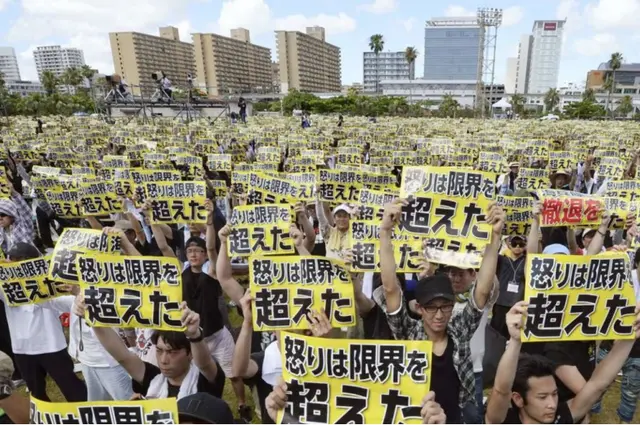Thousands of Okinawans rallied on an Ounoyama track field in Naha on June 19 to express their outrage over a former U.S. Marine who is under arrest in connection with the slaying of a local woman.
The demonstrators hoisted signs that read “anger going beyond limits” during the protest rally. The ex-service member, a civilian worker at Kadena Air Base in Okinawa Prefecture, was arrested in May.
He is suspected of raping and killing the 20-year-old woman, whose body was found in a wooded area in Onna in the prefecture after she went missing in late April.
The arrest has increased protests and rekindled anger against U.S. military bases in Okinawa. On May 26, the Okinawa prefectural assembly passed a resolution demanding the withdrawal of all U.S. Marines from the southernmost prefecture.
US dangles large land return as anti-military base resentment rises in Okinawa
The protest marked a new low for the United States and Japanese Prime Minister Shinzo Abe in their relations with the island and threatens plans to move the US Marines Futenma air station to a less populous part of the island.
The US and Japan agreed in 1996 to close Futenma, located in a residential area, after the rape of a 12-year-old Japanese schoolgirl by three US military personnel spurred mass demonstrations.
Rina Shimabukuro, 20, was raped and murdered. Photo: SCMP Picture
That plan has been on hold because residents near the proposed relocation site oppose the move, worrying about noise, pollution and crime.
Organisers said 65,000 people attended Sunday’s rally at a park in central Naha.
“Japan is part of Japan and when you hurt your little finger the whole body feels pain. I want Abe to feel Okinawa’s pain,” said Shigenori Tsuhako, 70, who came to the event because his grand daughter is the same age as the 20-year-old murdered woman, Rina Shimabukuro.
The US contractor, a former Marine, was arrested on May 19 on suspicion of abandoning the woman’s body, but has not yet been charged with killing her. In a separate incident earlier this month a US sailor was detained after injuring two people in a drink-driving incident.
Statistics do not suggest a major problem with US military crime on the sub-tropical island. But the cases have fuelled persistent irritation at the intrusive American military presence on overcrowded Okinawa.
Once the fiercest of enemies, now the best of friends: US and Japan are bound by their atomic legacy
The island hosts about 26,000 US troops, more than half the total Washington keeps in all of Japan under a longstanding security treaty, and residents have long complained at the disproportionately heavy US footprint.
Okinawa was the scene of a bloody battle between Japan and the US in the waning months of the second world war, followed by a 27-year American occupation that only ended in 1972 with its reversion to Japanese control.
People pray for the slain local woman, near the site where her body was found. Photo: Kyodo
The US military has gone all out to condemn the recent incidents and take measures to avoid further trouble, while the vast majority of its troops try to avoid the stigma created by their comrades who break the law.
Worried that more crimes could jeopardise the alliance, the military has been quick to express sympathy with Okinawans and taken steps to curtail problematic behaviour, such as restricting alcohol consumption and imposing a curfew.
“The overwhelming majority of American service members are law-abiding, upstanding members of this shared community,” First Lieutenant George McArthur, a Marine public affairs officer,said in a written response to questions.
“There is not an Okinawan and an American way to view horrific crimes - only one view, and that is that we are all repulsed, angry and grieving together.”
US Marine Corps MV-22 Osprey aircraft sit on the tarmac at US Marine Corps Air Station Futenma surrounded by overcrowded residential areas in Ginowan on Okinawa Island. File photo: EPA
Troops were instructed to stay away from the venue of Sunday’s protest in the prefectural capital of Naha out of respect “and to prevent any possible conflict”, McArthur said.
Since the murder fewer troops are visiting the outdoor mall - where shops, restaurants and bars have names like American Depot, Garage House, Camp Market and Outlet J. - during evening hours, said Yoshie Morota, who runs a souvenir shop, though they still come during daytime.
“The crime made my stomach turn,” Morota, 60, said of the rape and murder. “But it doesn’t mean that all the Americans are bad.”
She said around 30 service personnel picked up litter at a busy car parking area early Saturday at the complex and appeared to share a sense of grief with local residents.
A demonstrator holds a placard during Sunday’s rally. Photo: AFP
In May the US military imposed a 30-day period of mourning, putting troops under curfew and banning the buying and consuming of alcohol off base.
Last year criminal cases suspected to be linked to the US military represented just 0.8 per cent of all cases in Okinawa, according to figures from the prefectural government, remaining under one per cent for the third year in a row.
Japan’s Prime Minister Shinzo Abe suspends work on Okinawa over US base relocation as talks resume
But critics say high-profile incidents are likely to keep happening as the actual number of troops coming to Okinawa is larger than statistics suggest, given they regularly rotate through and tend to stay for a limited period.
“In reality, the number of perpetrators is huge,” said Suzuyo Takazato, a female rights activist in Okinawa.
“Even if only one serviceman out of 100 commits a crime, it means 10 out of 1,000, and 100 out of 10,000, do.”
(APD)
 简体中文
简体中文

